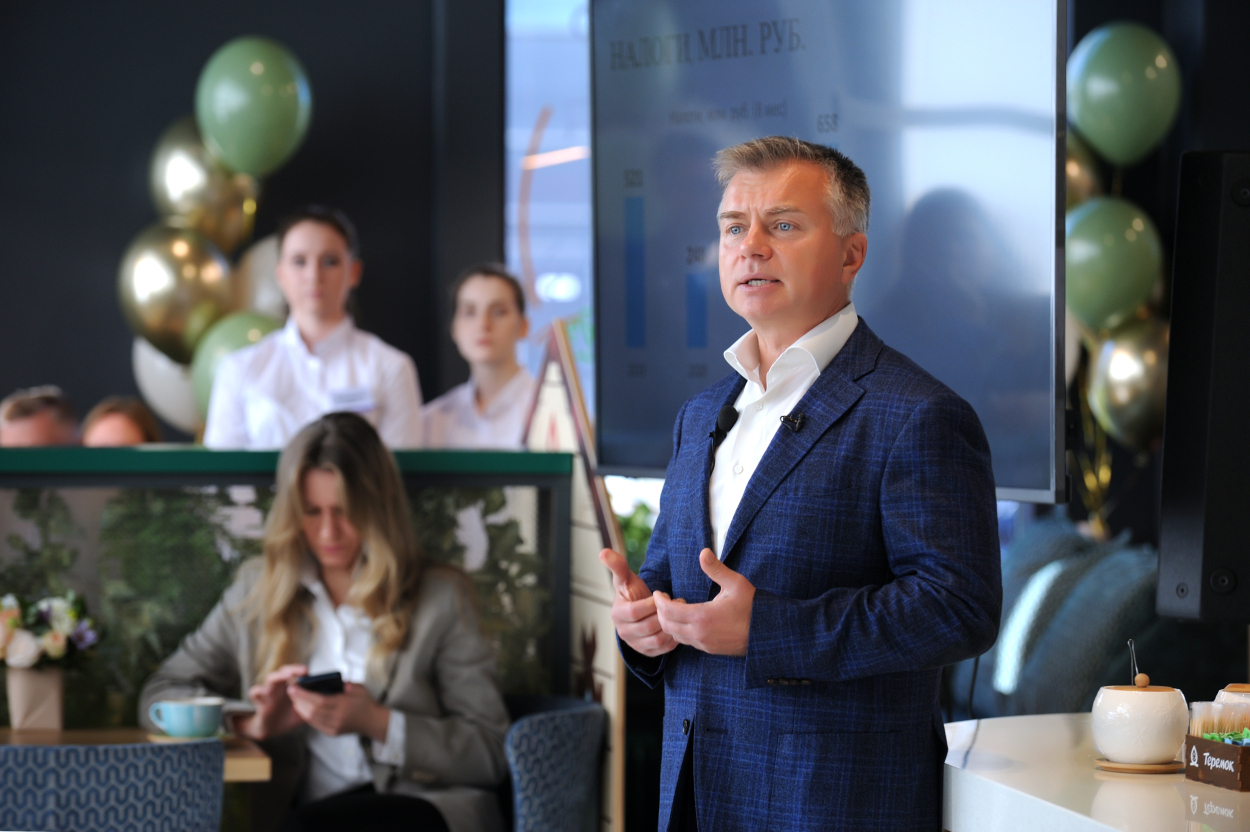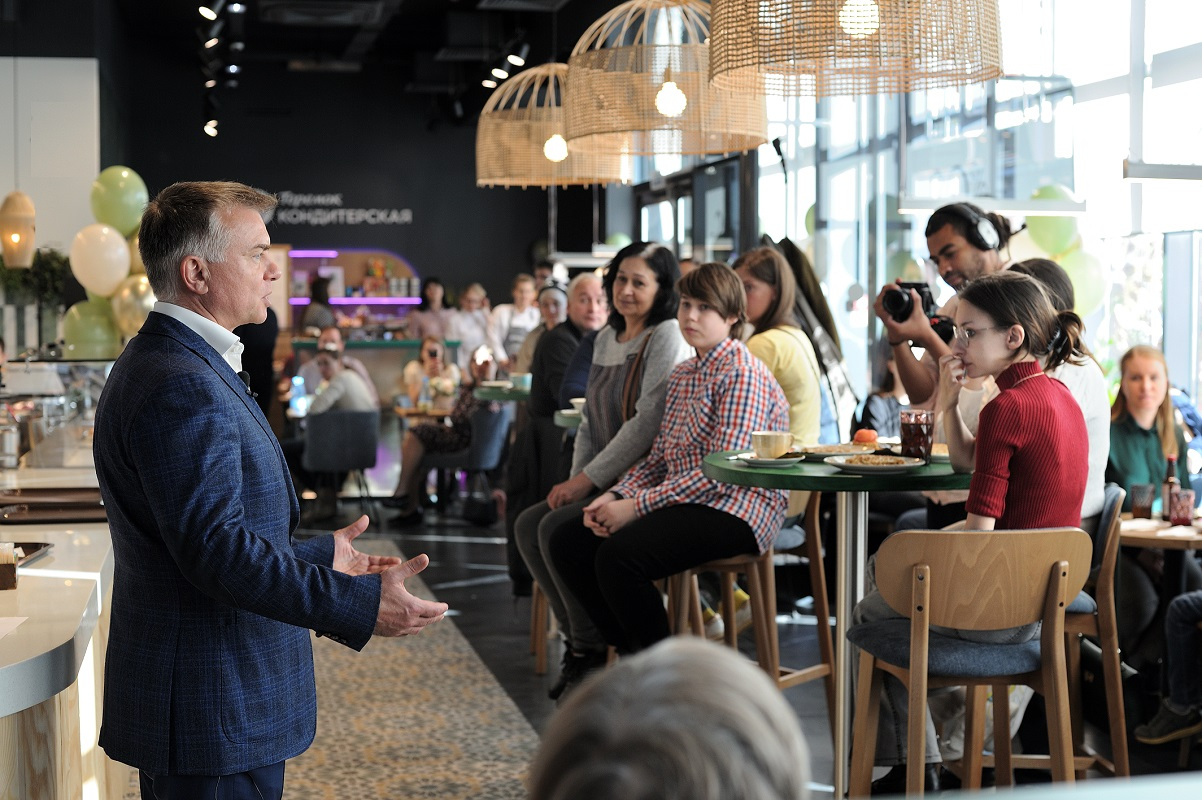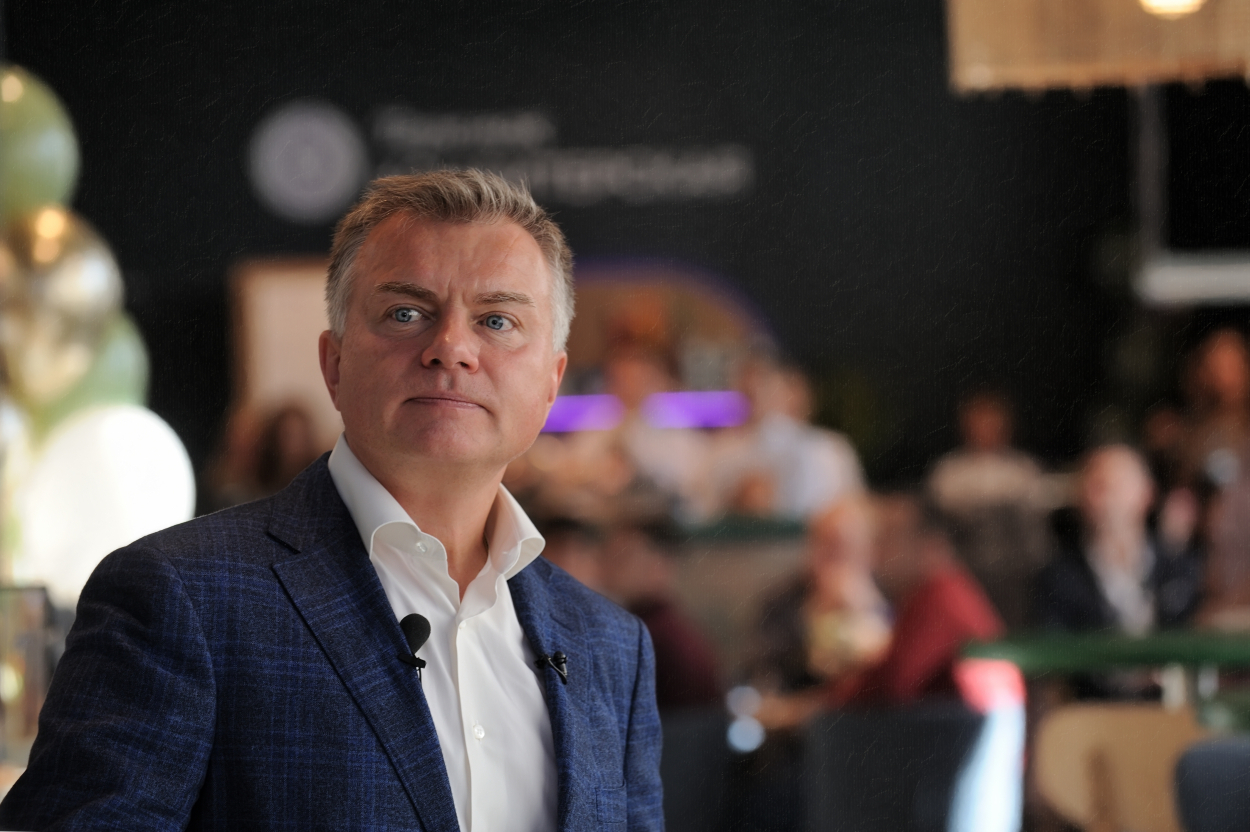Vitaly Svidovskiy: "The knowledge acquired at the University laid the foundation for many accomplishments in my life"
Vitaly Svidovskiy, a graduate of St Petersburg University and the co-founder and CEO of Teremok restaurant chain in St Petersburg, spoke about how he attained remarkable business success; his secrets to achievement; social projects; and the distinctive qualities that set graduates of the University apart.

Mr Svidovskiy, after graduating from St Petersburg University with a degree in Sociology in 1994, you were able to achieve notable success in business. How instrumental was your education in your professional activities? Did applying a sociological lens to market analysis provide you with deeper insights and a better understanding of economic processes?
"As a kid, when asked, 'What do you want to be when you grow up?', I would respond, 'I don’t know. But I will study at the best educational institution in our country to gain deep knowledge and develop skills.' I recall those words now with some surprise because one of the most vivid memories of my life is my time studying at Leningrad State University (during the Soviet period, St Petersburg University was known as Leningrad State University)."
I was born in the city of Orenburg. After school, I chose to enlist for military service in the Soviet army. I decided against going to university immediately after school because I wanted to understand what I really wanted to do in life. Then, I set a goal for myself and told everyone that I want to study at Leningrad University, because it is the best educational institution! Many people tried to dissuade me, saying that it would not work out. But six months before my discharge from the army, I started preparing for entrance exams. When I arrived in Leningrad, I immediately enrolled in preparatory courses for mathematics and the Russian language. And I was admitted.
The knowledge acquired at the University laid the foundation for many accomplishments in my life. It broadened my horizons and enabled me to implement my ideas. The skills of reflection, critical thinking, and analysis have been invaluable in my work. Interestingly, we were the inaugural class of sociology students. At that time, the Faculty of Sociology did not even have its own building, and we studied at the Faculty of Economics. Thus, in fact, I am an economist-sociologist and a lecturer, which has also been useful in organising work processes. Our company has established three training centres and developed our own multi-level employee training system.
The catering industry is a multifaceted business. Is there room for innovation within it? What would you consider more important — preserving traditions or keeping pace with the spirit of the times?
I have to say straight away that I am a fairly conservative person who values traditions. For me, traditions above all present continuity. However, living in a modern world, we also need innovations. The key is to set the right goals for these innovations — they should streamline routine work, allowing individuals more time for cultural and spiritual pursuits. Hence, we advocate for balance. We have even launched a project called "Improving working conditions and productivity". We are looking for opportunities of retaining manual food serving while automating mechanical and repetitive tasks.
Our goal is to reignite interest in and respect for Russian culture. Many of my friends and acquaintances from Europe come to visit me, and when they come to Teremok, they remark that they have nothing quite like Teremok back home. In fact, we are not just setting a standard but demonstrating a superior level of restaurant organisation. This is true not only for Teremok but also for many restaurants in St Petersburg, which now excel in concept, quality, and the originality of their dishes. This is something we can truly be proud of.

Who came up with the idea of addressing your customers as "sudars" and "sudarynias"?
Before Teremok was founded, my partner, Mikhail Goncharov, and I were involved in the industrial machinery supply business. Once Mikhail returned from a trip to France and shared with me fascinating stories about a street dedicated solely to pancake vendors. This simple product was incredibly popular there. In Russia, blini, the traditional thin pancakes, were not typically seen as fast food, while in France they developed a whole concept of a pancake shop. It was in May 1998. At that time, we were successful businessmen dealing in industrial equipment. In August 1998, however, the economic crisis began, leaving us with nothing but loans. To repay the banks, we sold all our machinery. We were left penniless, but rich with experience. Then, we got down to discussing and planning our new project — Teremok. When deciding on the name, we chose Teremok for its positive associations. Next, we considered how to address our customers. Sir? Madam? We explored various options, drawing inspiration from historical literature, classics, and the works of Fedor Dostoevsky, where the traditional addresses "sudar" and "sudarynia" were used. After brainstorming and considering different names, fonts, and concepts, we settled on the Russian archaic addresses "sudar" and "sudarynia". Thus they became Teremok’s signature greetings. No other fast food chain uses this style of address, and we take pride in it.
Your company has been in operation for over 25 years. What was the most challenging period in the business’s development? And who are your competitors now?
The most serious test was the pandemic. It was a period of economic crisis when our sales dropped dramatically. As a subject of economic activity, we faced a liquidity crisis. However, we quickly learned to recover. This resilience appears to be a quality that Teremok has developed over its 25 years of operation — we have learnt to respond swiftly and effectively to external challenges.
The pandemic, however, presented a dual crisis: revenue halted while our obligations, such as wages, rent, and supplier payments, continued. This was an immense challenge. Nonetheless, it ultimately cemented the company together, defining its spirit and character. We maintained our commitment to selling only high-quality products, with no compromises or simplifications. Still, it should be stressed that our team was strong and tight-knit. And I want express a heartfelt "thank you" to everyone who believed in us, persevered, and helped the company to endure.
Who are our main competitors now? They are creative companies similar to us. We create a restaurant product and serve a large number of guests, up to 50,000 people a day. This is quite challenging indeed. While I will not name specific competitors, I can describe them as companies that love what they do and are passionately dedicated to it. This is the only way to create a unique offering that customers will truly appreciate.
Behind every successful business are the people. You must have assembled a great team over the years. What is the secret of your success?
I once read a response from a prominent American entrepreneur who was asked a similar question. He said, "I am 70 years old, and my company is one of the five most successful companies in America. Over time, I have learned to see through people at about 60 percent of the time. Previously, when I was correct only at 20 percent of the cases, I would choose someone who would ultimately let me down. Now, I am correct at about 60 percent of the time." This resonates with my own thoughts. Of course, in any business with numerous employees, the most challenging part is finding a balance. It is crucial to create an environment where employees feel free to be creative. Yet, it is no less important that we uphold our principles. This synergy prevents us from resting on our laurels and helps us to find growth opportunities everywhere.
As a matter of fact, anyone can develop their professional skills. Nevertheless, I believe that without natural talent in a specific area, reaching the top is unlikely. A true leader in the industry is a company that not only creates unique products or services but also consistently maintains high standards. This is where talent becomes essential. People, however, may not always recognise their talents. It is crucial to create an environment where these talents can be discovered and nurtured. For instance, someone might believe that he is an accountant when he is actually an artist. There are many such cases, and I count myself among them.
When I entered the University, I underwent testing and tried to figure out who I am. I think my talent lies in creating new ideas and implementing them with the support of a team.

Which corporate values do you believe should be prioritised today?
We always underline that professional skills are crucial in any job as they enable employees to handle various work tasks effectively. But our company additionally emphasises two essential values: the ability to work well in a team and strong personal qualities.
The personal qualities we value most are: character, determination, commitment, responsibility, and initiative. We also include individuals’ life principles in this category. We all have our principles in life. For instance, the mindset of "I don’t care where I work, as long as the pay is good’ does not align with our company’s values. We believe that one’s attitude towards work is important. Our guiding principle is: ‘I do the work I love, I enjoy it, and I get paid for it." These are the words of our designer. That is what she said to me: "Vitaly, I am happy because I do what I love. It brings me pleasure and joy, and I do not get tired of it. I engage in the creative process and get well-compensated for it." I believe that only people who share this mindset can truly excel in their work and this is how innovative ideas are born.
You initiate and actively engage in social projects. Could you please share their significance for you and the company? What are you most proud of?
In 2018, as we were preparing for Teremok’s 20th anniversary and planning celebrations, we had a realisation: successful companies have a responsibility to care for others. These include those who may feel disadvantaged or less fortunate due to natural circumstances or life events. It was then that the "Pancake of Good Deeds" project was born. Our approach goes beyond simply donating money to some organisations. Our employees actively participate in socially impactful initiatives to help others. For example, we have an annual tradition in May when we participate in city-wide spring cleaning. This year, we thought about beautiful but rather neglected lawns near two of our restaurants. We decided to give them some care by planting flowers and shrubs. Now, these areas not only enhance the experience for our restaurant guests but also bring joy to other residents of the city.
We have also collaborated with children’s hospices. Visiting places where children are seriously ill can be extremely challenging, but we brought them our confectionery, conducted workshops, and shared stories about our work. Through these experiences, we realised that what these children truly need is attention, kindness, and care. It turned out that many of our employees possess immense empathy and warmth. Engaging in such projects helps people uncover qualities like compassion and kindness within themselves — qualities that are often lacking in today’s society.
Could you please share your memories of studying at the University? In your opinion, are there any qualities that set graduates of the University apart from graduates of other higher education institutions?
I believe that unique individuals choose to study at the University. Once there, you are immersed in a free and creative environment. Naturally, the University has always attracted interesting and talented lecturers who not only teach but also inspire students to pursue knowledge. As a student, I worked hard and put a lot of efforts, but the requirements were high and it was a challenging experience. We acquired a wealth of knowledge, the value of which I did not immediately grasp. At first, I could not understand why we were taught philosophy, but my perspective changed over time. The reasoning of great thinkers and the interplay of historical facts began to make sense. This is because the University’s most important goal is to teach you to think and analyse critically. The University spirit remains with me to this day. I hold great affection for the University and am proud that my son is also a graduate of St Petersburg University.
This year, our sociology class celebrated its 30th anniversary since graduation. The highlight was that almost all of our lecturers attended the reunion. We had a heartfelt conversation, and it was clear that they remember us fondly. Our achievements have been the greatest expression of gratitude to them. They brought up people who contribute to the development of the country and attain notable results.

